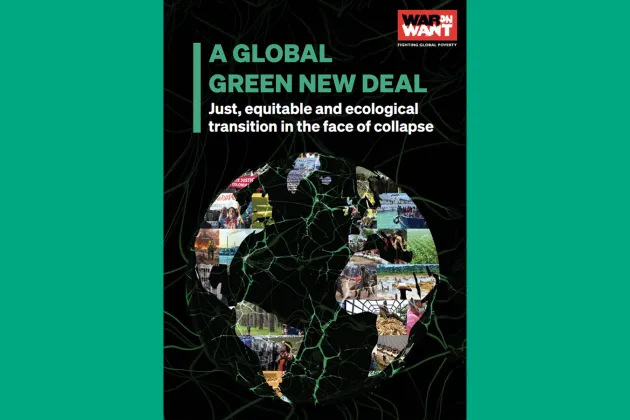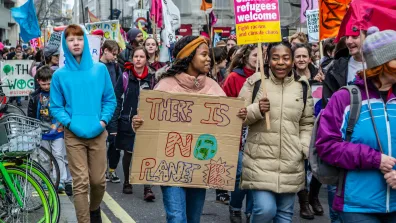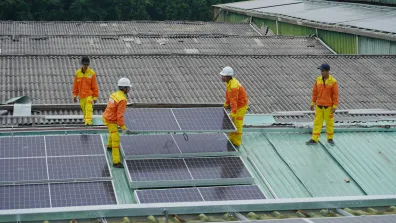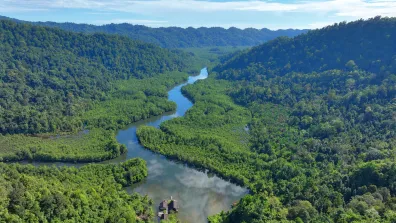Azadi Fund for Just, Equitable and Ecological Transitions
The Azadi Fund for Just, Equitable and Ecological Transitions works to realise a world where everyone, everywhere, can thrive within the boundaries of the planet’s life-sustaining ecosystems.
‘Azadi’ is at the heart of all we do – meaning ‘freedom’ or ‘liberty’ in multiple languages. For us, Azadi means:
- Freedom from climate breakdown.
- Freedom from inequality.
- Freedom from injustice.
The Azadi Fund believes real transformation comes from shifting power. Away from failing economic and industrial systems – built by colonialism to enrich the elite – towards just alternatives. Publicly owned. Democratically governed. Designed to serve the global majority.
The Azadi Fund shifts power as it recognises the intersectional nature of the crises we face. It strengthens grassroots organisations in the Global South – helping them connect, share knowledge, and build collective expertise. Together, we are a ‘movement of movements’ – standing in solidarity, amplifying each other’s struggles, and leveraging our collective power to drive systemic change at a regional, national and global level.
For the Azadi Fund, just, equitable and ecological transitions are the only way forward. Solutions must be:
Just: Frontline communities – who’ve contributed the least to climate breakdown – must not suffer its greatest consequences. Climate solutions must be fair and just. This is only achieved by uprooting injustices like colonialism and capitalism designed to make the super-rich more wealthy. Wealth and resources must be redistributed so everyone can live with dignity.
Equitable: We must dismantle the barriers denying Global South countries fair access to resources, technology, and sustainable economic growth. Extreme inequality will only end when financially poorer countries have control over their economies and the decisions shaping their lives. Self-determination and dignity should not be privileges of the super-rich.
Ecological: Lasting change requires acting within ecological boundaries. Climate breakdown, extreme inequality, biodiversity loss are connected. They demand intersectional solutions that are just, equitable, and balanced with nature. We must build solutions founded in the principles of care and repair to heal the damage of extractive systems and refocus society to thrive with nature.
The Azadi Fund focuses its grant making in four main areas:
1. Renewable energy as a public good that’s publicly controlled
The global energy sector is broken. Fossil fuel expansion continues, yet millions remain in energy poverty. As global heating threatens to rise above the critical 1.5˚C threshold, a just transition is impossible under a profit-driven system run by private companies. Humanity and the planet are threatened with more frequent and severe climate disasters, biodiversity loss, and increased climate-related conflict. Just transitions can only be won by reclaiming energy as a public good – publicly owned and managed to meet people’s needs, not maximise profit.
Examples of what the Azadi Fund supports:
- Challenges dominant industrial, profit-led energy models and promotes just, sustainable alternatives.
- Resists false solutions like carbon offsetting or techno-fixes which perpetuate extractivism at the expense of progressive, community-led strategies.
- Builds alliances in the Global South that connect the energy crisis with in intersectional struggles around the world.
2. Reclaiming food systems: land, water & food rights
Heavily industrialised and profit-driven agri-food systems are destroying biodiversity and pushing millions of people into acute food insecurity. Richer governments and private actors control resources - pressuring Global South countries into producing cash crops for export. This increases domestic reliance on imports, deepens national debt, and places marginalised communities at the mercy of international markets. We need just alternatives founded in food sovereignty, land rights, and ecological justice.
Examples of what the Azadi Fund supports:
- Resists corporate control over food systems to preserve seed access and biodiversity.
- Expands agroecology knowledge and practice as the foundation of national sovereignty-based food systems, reducing reliance on imports.
- Increases cooperation to link land, water, and food rights to other movements like workers’ rights, climate justice, and the rights of Indigenous peoples.
3. Livelihoods for resilience: living incomes, fair work & public services
Over 1.4 billion people still lack access to essential public services. Millions are denied decent housing, healthcare, education, energy and transport. Organised labour has long driven transformative change. Workers’ movements have improved livelihoods, secured fairer working conditions, and developed community resilience to environmental, economic, and social shocks. Organising workers is a vital part of delivering just, equitable, and ecological transitions.
Examples of what the Azadi Fund supports:
- Builds strong, representative and intersectional worker-led movements – especially in low paid sectors supplying global export markets like food and fashion, or the informal economy.
- Expands educating, organising, and policy capacity of worker-led organisations to advance just and sustainable alternatives.
- Forges alliances between labour, environmental, feminist, and economic justice movements against extractivism, capitalism, and colonialism.
4. Transforming a rigged global economy: debt, tax and trade
The top 1% holds outsized wealth, power, and influence. Economic systems that fail the vast majority of the world’s population perpetuate fossil fuel dependence, deepen inequality, and maintain geo-political power structures. The rigged economy is a major barrier for just, equitable, and ecological transitions. It must be challenged at a national, regional, and global level to reverse deepening inequality, climate breakdown, and biodiversity loss.
Examples of what the Azadi Fund supports:
- Campaigns, policy development, and research that challenge unjust debt and trade regimes that limit the ability of Global South governments to implement just, equitable, and ecological transitions.
- Education, activity leadership, and political education to help movements build mass support and develop their organising capacity.
- Improved cross-movement cooperation that builds Global South power by mobilising oppressive global financial and trade frameworks. Energy, food, workers rights are shared struggles against a rigged economic system.
For more information on the Azadi Fund for Just, Equitable, and Ecological Transitions, please contact:
Ruth Ogier, Head of International Programmes, War on Want
44-48 Shepherdess Walk, London, N1 7JP , United Kingdom



